The economic recession’s impact on libraries has become a hot topic in recent months. Prompted by editorials and news stories from around the country, the Library Research Service (LRS) undertook our latest 60-Second Survey, “Libraries and the Economic Recession.” The goal of this survey was to gather input from librarians in the field about how their libraries and careers have been impacted by the current economic situation. Nearly 500 people working in public, academic, school, and special libraries responded. The results indicate that while public libraries are seeing much of the increase in traffic and library use, employees in all types of libraries are feeling the pressures of the economic recession.
What is an LRS 60-Second Survey?
In the style of an online readers’ poll, the 60-Second Survey format is short and to the point. By definition, the survey can be answered in a minute or less. Narrow by intent, 60-Second Surveys capture the perceptions and knowledge of respondents on a single timely topic. The online surveys are distributed electronically via email, listservs, blogs, etc. Results are reported briefly on the LRS blog and in more detail in Fast Facts.
Increases in Library Use and Requests for Help
The first set of questions asked for respondents’ personal observations about increases in requests for assistance and increases in the use of library services.
Computer use was a dominant theme in the responses. When asked if they were helping more patrons with selected library services, 70 percent of respondents said they had noticed an increase in requests for help using computers, while 66 percent reported more requests for assistance with job-seeking activities, such as filling out online applications or resume preparation (see Chart 1). These percentages were even higher among those working at public libraries, with 9 out of 10 public library employees identifying an increase in requests for assistance with computers and/or job-seeking activities.
“As a librarian in a large urban library system struggling to keep up with the sheer volume of customers needing help with technology, I have experienced the impact of the economic downturn firsthand – in particular with access to technology. Often my staff and I are helping multiple customers with few or no computer skills…”
Chart 1
Reported Increases in Patron Requests for Assistance with Library Services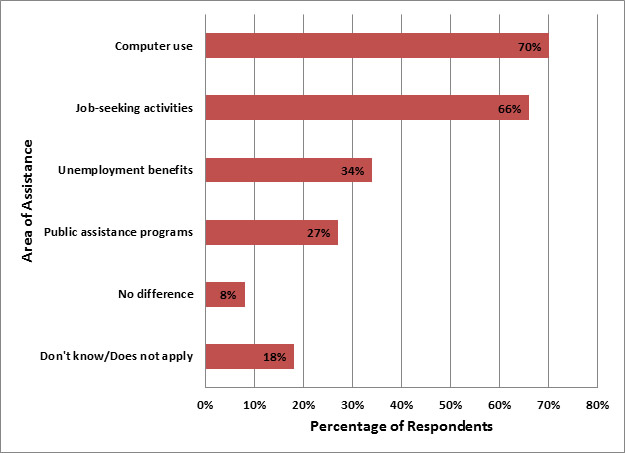 Note: Chart details responses to the question, “In the last 12 months, have you had to help more patrons with them following services?”
Note: Chart details responses to the question, “In the last 12 months, have you had to help more patrons with them following services?”
Similarly, when asked whether they had personally noticed an increase in use of selected library resources in the last 12 months, 67 percent reported an increase in the use of public access computers. Sixty-three percent noted an increase in library visits, and 54 percent said they had seen an increase in the circulation of library materials (see Chart 2).
“Many people have come in to apply for jobs or apply for unemployment benefits that don’t know how to use a computer and helping them has been a strain. Also, many people have sad stories to tell and just need someone to listen.”
“There are more people coming into the library than ever before. We are getting patrons who tell us they didn’t know we existed, never needed us before. Now they need us for job information, computers, printers, and public assistance information. Most of our users have never needed public assistance. I have lots of pamphlets and information that I never see anyone take, but it needs [to be] constantly re-stocked. I have also seen an increase in very stressed-out people on the edge. I’m just hoping I still have a job next year.”
Chart 2
Reported Increases in Patron Use of Library Services
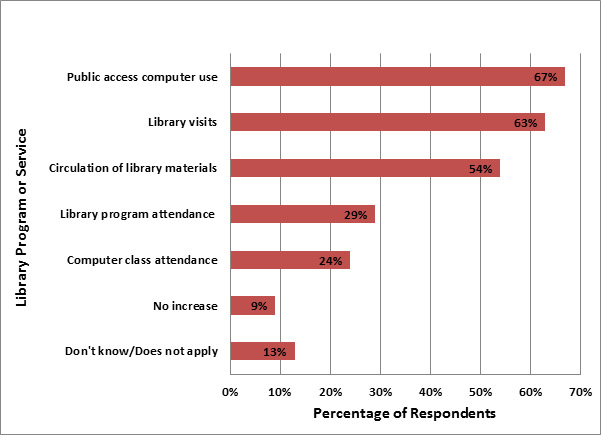 Note: Chart details responses to the question, “In the last 12 months have you personally noticed an increase in use of the following resources at your library?”
Note: Chart details responses to the question, “In the last 12 months have you personally noticed an increase in use of the following resources at your library?”
Impact on Library Jobs
The second set of questions in the survey asked respondents how the economic recession has impacted their jobs. To determine which staff-related cost-cutting measures libraries were taking, the survey asked respondents to identify any cost-cutting measures they had experienced in the last 12 months. The largest percentage (36%) indicated that none of the selected measures had been taken at their library. Nearly 1 in 3 (32%) said their job duties had increased or changed in the last 12 months, and almost 30 percent said salaries or benefits in their current job had been frozen or cut (see Chart 3).
“We are serving people in our community who had never before used any of our services. They are surprised to see how much we have to offer. They did not expect the level of technology, variety of programs, or the up-to-date collection to be available in their hometown public library.”
Chart 3
Respondents Reporting Selected Cost-Cutting Measures at Work
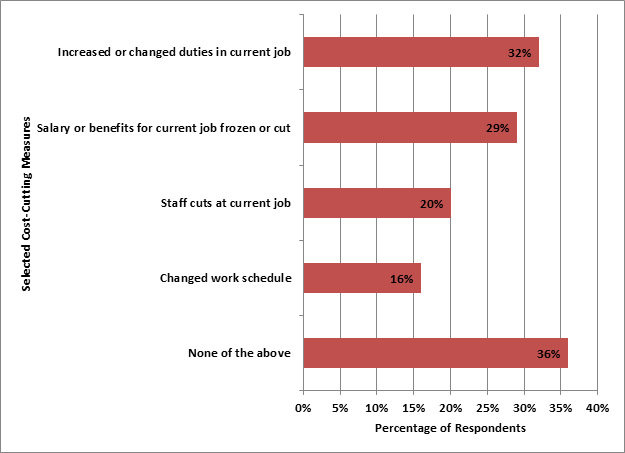 Note: Chart details responses to the question, “Which, if any, of the following has happened to you in the last 12 months?”
Note: Chart details responses to the question, “Which, if any, of the following has happened to you in the last 12 months?”
“Not only are we seeing an increase in overall visitors, we notice an increase in highly educated people with very limited library skills. Upper middle class new users who are making the decision to use ‘prepaid’ public library services when they used to meet those needs through video rentals, bookstores, home Internet, etc.”
When asked how the current economic recession has changed their career plans, 2 out of 5 (40%) said their plans had not changed. One in 4 (25%) said they would retire later than planned; 39 percent claimed they would stay in their current library job as a result of the recession. Responses to these job-related questions indicate that although libraries were seeing changes, a large percentage of respondents were unaffected and had not changed their career plans.
“As a solo librarian in a small library, I have lost my total budget and now must rely on donations and free books for acquisitions. Additionally the part-time assistant position has been cut so I must pick-up those job tasks as well as other tasks created by lost positions in other parts of the organization.”
Additional Training
The final set of questions asked respondents whether they felt the need for additional professional training. When asked if they could use training for their own professional development, 44 percent identified stress management as an area in which they could use assistance, 31 percent said dealing with difficult patrons, and 29 percent chose computer skills/software training (see Chart 4).
Chart 4
Respondents Identifying Areas of Training for Their Own Professional Development
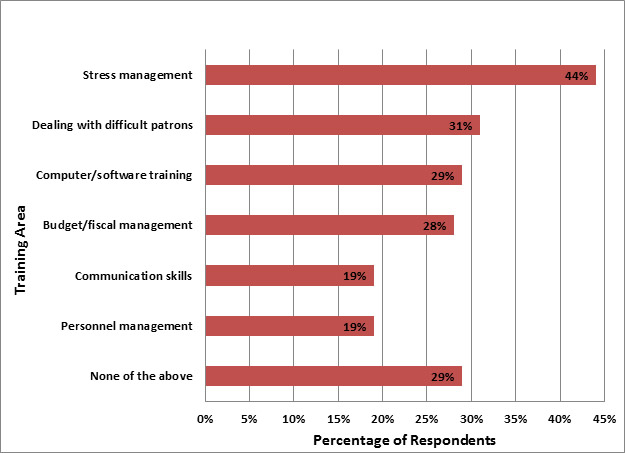 Note: Chart details responses to the question, “As a result of the current economic downturn, do you feel a need for additional training in any of the following areas for your own professional development?”
Note: Chart details responses to the question, “As a result of the current economic downturn, do you feel a need for additional training in any of the following areas for your own professional development?”
Finally, respondents were asked whether they would benefit from additional professional training in order to better serve patrons. Nearly half (46%) said they could use training on identifying available assistance/social programs for patrons. Thirty percent said they would benefit from training on how to help job seekers, and 18 percent selected training on how to instruct patrons on basic computer use. Almost another half (44%) chose “none of the above.” Those working in rural libraries were more likely than their counterparts in urban or suburban libraries to say they would benefit from additional professional training (see Chart 5).
Chart 5
Professional Training Needed to Improve Service to Patrons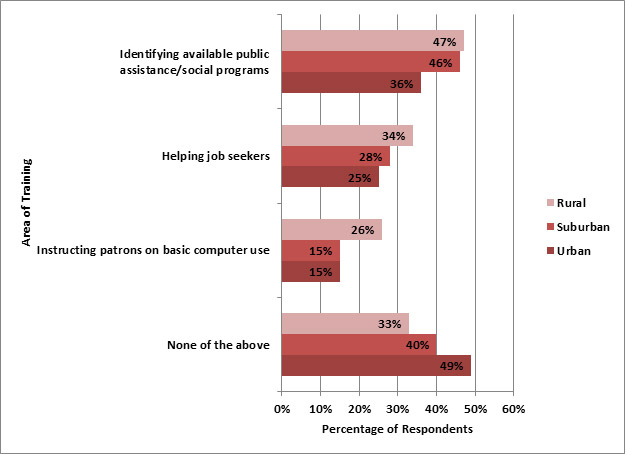 Note: Chart details responses to the question, “To better serve patrons, do you feel a need for additional professional training in any of the following areas,” arranged by the community type respondents selected.
Note: Chart details responses to the question, “To better serve patrons, do you feel a need for additional professional training in any of the following areas,” arranged by the community type respondents selected.
Conclusion
Media stories about the economic recession’s impact on library use and services are largely focused on public libraries. While this 60-Second Survey is not a comprehensive look at how the recession is challenging libraries, it does provide a snapshot of the changes employees at all types of libraries have witnessed with their patrons and experienced for themselves. Survey results and the anecdotal evidence provided by respondents in their open-ended comments demonstrate how the economic situation has influenced the way patrons use libraries and in many cases increased the stress of librarians.